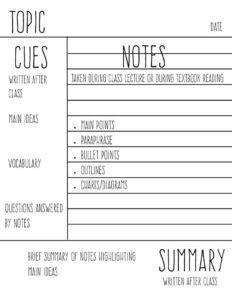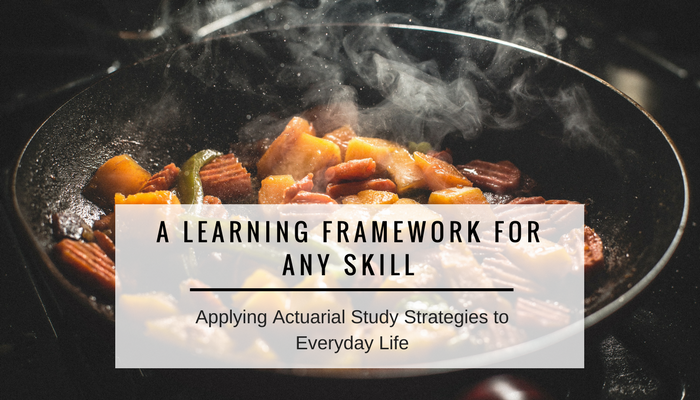Applying Actuarial Study Strategies to Everyday Life
Roy and I are passionate about learning; not just for actuarial exams, but any field in general.
In our book, we outlined our learning strategies as they apply to actuarial exams, but these strategies extend beyond the actuarial field. As one of our reviewers put it:
“I highly recommend this book, not just for actuarial exam students, but for anyone who wants to understand and internalize new information.”
It’s easy to see how actuarial exam study strategies can extend to other professional exams in related fields (e.g. CFA exams, CPA exams), but how do they translate to non-technical fields? In this article, I’ll explore two personal applications of these learning strategies: cooking and college classes.
Cooking – new skill acquisition
I always viewed cooking as one of the life skills that would be nice to know but that I never had time to learn. After my exam last fall, I decided to finally take the plunge and learn how to cook.
Roy and I had just finished the first draft of our book, so this was the perfect opportunity to apply the learning framework to a completely different skill.
With the numerous books, websites and TV shows on the subject, I thought learning to cook was just as overwhelming as studying for an actuarial exam.
Many friends suggested a simple approach to get started: pick random recipes that sound tasty, and jump right in.
After following the instructions for a high volume of recipes, you would ideally recognize basic patterns and principles of good cooking (e.g. flavor pairings, cooking methods, knife skills, etc.). This is one way to learn, but I think there is a more direct approach: focus on the fundamental principles right from the start.
I view this as a quantity vs. quality issue – you can learn through a high quantity of brute force repetitions, or by fewer, high-quality repetitions.
Instead of focusing on what was in the recipe, I focused on why those components made a tasty dish. Why did these spices go well together? What would happen if I substituted this ingredient, or if I doubled the quantity of this ingredient?
Through these “why” and “what-if” questions, I could more quickly learn the basic principles of taste, flavor pairings, etc. Instead of trying to learn X number of recipes, I wanted to be comfortable cooking without a recipe and with ingredients that I had never used before.
This cooking example directly parallels actuarial exam studying – the recipes are like practice problems, and some people take a brute force approach of doing as many as possible.
However, you can take a direct path toward learning fundamental concepts by focusing on quality practice problems instead of quantity, and asking “why” and “what-if” for the different formula components.
The goal is to handle unknown problems on exam day, not just hope that the exam matches one of the many problem structures you had memorized.
Granted, I am far from being a proficient chef, but I learned a lot more about cooking in a few weeks of focusing on fundamental principles than if I would have randomly selected recipes and followed the directions verbatim.
The basic process and tools outlined in our book of identifying, understanding, and relating fundamental concepts have guided my learning in all areas.
College Classes – retain more information
I started researching effective study strategies and learning about Roy’s techniques during my senior year of college. Not surprisingly, this was the first time I could enjoy finals week and avoid the late-night study sessions in the library.
Active Recall
The biggest change in my study approach was how I reviewed information. Like many of my friends, I used to review my notes from class, and if I felt ambitious, I re-read certain textbook chapters.
That all changed when I learned about the benefits of active recall, or self-testing. We discuss this extensively in our sample chapters, but it comes down to the difference between storing and retrieving information.
Re-reading notes or textbook chapters helps you store information, but that’s not what you need on test day – you need to retrieve it from memory. Tools such as practice problems help you practice this retrieval, and they quickly point out gaps in your knowledge.
How do you implement this for non-actuarial classes where you don’t have practice problems to pull from?
One option is to adjust your note-taking method to create your own questions. You can use the Cornell method (or a similar method that I use for FSA exams) to reformat your notes in a Q&A structure. Instead of simply re-reading your notes, you can quiz yourself on the questions you create.

If the Q&A note-taking format isn’t for you, then you can try other methods of self-testing such as flashcards.
Regardless of your personal preference, you can greatly improve your knowledge retention by focusing all review sessions around active recall.
Spaced Review
Combine these active recall techniques with spaced review sessions, and you will breeze through your finals (or any exams). Any easy way to implement the spacing effect is setting aside 15 minutes before class to review your questions from the previous week. This 15 minutes is not much, but it can save you many hours of review down the road. (More on the spacing effect and effective review)
Final Thoughts
Studying for actuarial exams (or any exams) is much more enjoyable when you become curious about the learning process and how it applies to different fields. I’ve used the principles from our book to learn a variety of skills, whether in the classroom or on the job.
You never know – testing your actuarial exam learning strategies in other areas may give you new insights on how to study for your next exam.
Study Smart, Pass Fast, Live Life
Mike & Roy

